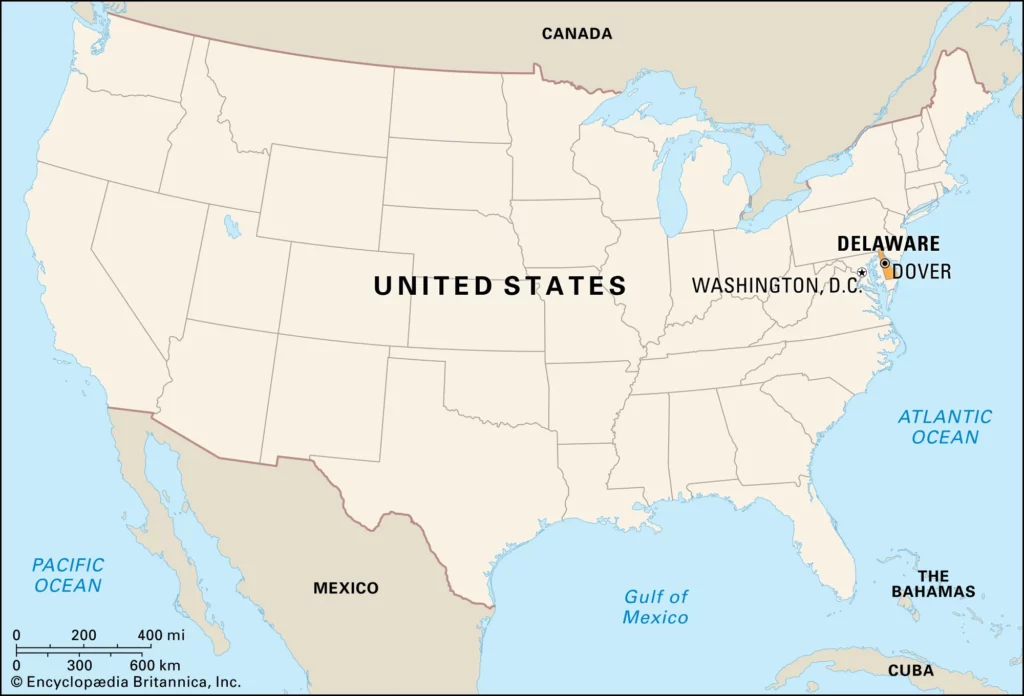
What is a Registered Agent in Delaware?
In Delaware, a Registered Agent acts as the official point of contact for a business entity. This includes corporations, limited liability companies (LLCs), partnerships, and other legal entities registered with the state.
This agent receives important legal and tax documents on behalf of the business. These include service of process (in the event of legal action), government communications, and notifications from the Secretary of State.
The role of a Delaware LLC Registered Agent is crucial. They ensure there is a reliable method for the government and other parties to communicate with a business.
Here are some key aspects of Registered Agents in Delaware:
Who Can Be a Registered Agent: A Registered Agent Delaware can be an individual residing in Delaware or a business entity authorized to operate in the state. They must have a physical address in Delaware, known as a registered office. The agent must be available during normal business hours to accept documents.
Legal Requirement: Appointing a Delaware LLC Registered Agent is a legal requirement for conducting business in Delaware. It ensures that the business can be legally contacted if necessary.
Privacy and Efficiency: For some businesses, using a Delaware Registered Agent Service can help maintain privacy. It also ensures important documents are handled efficiently and on time, reducing the risk of missed deadlines.
Changing a Registered Agent: If a business changes its Delaware registered agents, it must file the necessary forms with the Delaware Secretary of State and pay any required fee.
Public Record: The name and address of a business’s Delaware LLC Registered Agent are public record and can be searched through the Secretary of State’s website. This transparency helps maintain trust in the business environment.
How can I determine if my Delaware business needs a Registered Agent?
In Delaware, almost every formal business entity is required to have a Registered Agent Delaware. To determine if your Delaware business needs a Resident Agent, consider the following factors:
Business Entity Type: If your business is a corporation, LLC, LP, LLP, or another formal entity registered with the Delaware Division of Corporations, you must have a Registered Agent Delaware.
Operating in Delaware: If your business is formed in another state but operates in Delaware, commonly known as a foreign entity, you must also have a Delaware registered agent service. This requirement ensures there is a reliable method for service of process and receiving official government documents in the state.
Legal Requirements: The requirement for a Resident Agent is established by Delaware law to ensure there is a designated representative available to accept legal notices, tax documents, compliance-related correspondence, and other official communications on behalf of the business.
If your business falls into any of the above categories, it is mandatory to designate a Registered Agent in Delaware. The Resident Agent must have a physical address in Delaware, where they can receive documents during normal business hours.
Do sole proprietorships and partnerships need a Registered Agent in Delaware?
Sole proprietorships and general partnerships that are not registered with the state may not have the same Registered Agent requirement as formal entities. However, if they register, such as by filing a fictitious name or obtaining certain licenses, they may become subject to this requirement.
If you’re unsure whether your business needs a Registered Agent in Delaware, consult a legal advisor or contact the Delaware Division of Corporations for guidance tailored to your situation.
What does a Statutory Agent Do for a Delaware business?

A Registered Agent Delaware plays a critical role for businesses in Delaware, serving as the official point of contact for all legal and governmental communication. The key responsibilities and functions of Delaware Resident Agents include:
Accepting Service of Process: One of the primary roles of a Registered Agent is to receive service of process on behalf of the business. This includes summonses, complaints, and other legal documents related to lawsuits.
Receiving Official Government Correspondence: Registered Agents are responsible for accepting official communications from the state, such as tax notices, compliance filings, and renewal notices.
Accepting Other Legal Documents: Apart from service of process, Statutory Agents may also receive other legal documents or notices directed to the business, such as contracts or amendments to business registration.
Forwarding Documents: Statutory Agents are responsible for promptly forwarding all received documents to the appropriate individual or department within the business to ensure timely responses and action.
Maintaining Availability: A Registered Agent must maintain a physical presence at the provided address during standard business hours to ensure the reliable delivery of legal and official documents.
By fulfilling these duties, Delaware Resident Agents help to ensure that a Delaware business remains in good standing with the state, complies with all legal requirements, and addresses legal actions and governmental communications promptly and efficiently.
Are there any legal requirements specific to Delaware when selecting a Statutory Agent for my business?
Yes, Delaware has specific legal requirements that must be met when selecting a Registered Agent for your business. These requirements are important to ensure that your business remains in compliance with state laws and regulations. Here are the key legal requirements for selecting a Registered Agent in Delaware:
Physical Presence: The Registered Agent must have a physical street address in Delaware, known as a registered office. This cannot be a P.O. Box. The address is essential for receiving legal documents and service of process in person.
Availability: The Registered Agent must be available at the registered office during normal business hours to accept legal documents and other state filings on behalf of your business. This ensures that important legal and state communications are received without delay.
Legal Entity Status: If the Resident Agent is a company or organization, it must be authorized to conduct business in Delaware. This means a foreign (non-Delaware) entity serving as a Registered Agent must be registered to do business in Delaware.
Consent of the Registered Agent: The individual or entity selected as the Registered Agent must consent to act in that capacity. While specific documentation of this consent is not always required to be filed with the state, maintaining a record of consent is advisable.
By adhering to these legal requirements, your Delaware business can ensure that it maintains good standing with the state and that legal and official communications are managed effectively. Failure to meet these requirements could result in penalty fees, the inability to legally operate your business in Delaware, or the administrative dissolution of your business by the state.
How often should a Delaware business update its Resident Agent information?

Delaware businesses should update their Resident Agent information whenever there is a change to the agent’s name, address, or contact information to ensure compliance and the smooth handling of legal and state communications. There isn’t a mandated frequency for updates like “annually” or “biennially”; instead, updates should be made as necessary to reflect current and accurate information. Here are some scenarios that necessitate an update:
Change of Registered Agent: If your business decides to change its Registered Agent to another individual or service, you must file the appropriate change of agent form with the Delaware Division of Corporations.
Registered Agent Relocation: If your Registered Agent moves to a new address, even if within Delaware, you need to update the address on file to ensure the agent can continue to reliably receive documents on your behalf.
Changes in Contact Information: Any changes in the contact details (such as phone number or email) of the Registered Agent that could impact communication should also be updated, although this might not always require formal filing with the state.
To update Registered Agent information in Delaware, the business typically needs to file a specific form (such as a “Change of Agent” form) with the Delaware Division of Corporations and may be required to pay a filing fee. It is essential to complete these updates promptly to avoid missed communications or service of process, which could have legal ramifications for your business.
Maintaining up-to-date Registered Agent information is a critical component of ensuring that your business remains in good standing with the state of Delaware and can adequately respond to legal actions and state filings.
What is the easiest way to get a Registered Agent in Delaware?
Finding a reliable Registered Agent is crucial for your Delaware business to ensure you meet all legal requisites and maintain good standing with the state. The simplest and most convenient way to secure a Registered Agent in Delaware is to use professional Registered Agent Services Delaware like FormPros. Here’s why choosing FormPros for your Registered Agent needs stands out as an excellent option:
- Expertise and Reliability: FormPros specializes in providing Registered Agent Services Delaware with a high level of professionalism. We have the expertise to handle all your legal notices and state communications efficiently, ensuring that your business stays compliant with Delaware regulations.
- Convenience: With FormPros, setting up a Delaware registered agent service is straightforward and hassle-free. You can fill out our online form, and our team of professionals will manage the rest, saving you time and effort.
How do I change a Statutory Agent in Delaware?

Changing your Registered Agent in Delaware is a straightforward process that ensures your business continues to meet the state’s legal requirements for maintaining a reliable point of contact. Here’s how to complete the change:
Select a New Registered Agent: Before filing any forms, ensure you have a new Registered Agent lined up who meets Delaware’s legal requirements. This can be either an individual residing in Delaware or a business entity authorized to conduct business in Delaware that agrees to act as your Registered Agent.
Obtain Consent: Although Delaware doesn’t always require written consent to be filed, it’s good practice to obtain written consent from your new Registered Agent, confirming they agree to serve as your agent and are aware of their responsibilities.
File the Change of Agent Form: To officially change your Registered Agent, you must file a Statement of Change of Registered Agent form with the Delaware Division of Corporations. This form can be specific to the type of business entity (e.g., corporation, LLC, etc.) and is available on the Division’s website.
Pay the Filing Fee: There is typically a filing fee associated with submitting a Statement of Change of Registered Agent. Ensure that you include the appropriate fee with your submission. Check the Delaware Division of Corporations website for the most current fee schedule.
Wait for Confirmation: After submitting the form and payment, wait for confirmation from the Delaware Division of Corporations. This confirmation will indicate that your new Registered Agent is officially on record.
It’s important to ensure that there is no lapse in having a Registered Agent on record during the transition. Missing important legal documents or state communications can lead to compliance issues and jeopardize your business’s good standing in Delaware.
For businesses that prefer a hassle-free process and professional service (including filing services): FormPros can handle the change of your Registered Agent, ensuring the transition is smooth and compliant with Delaware regulations.
Can I be my own Registered Agent in Delaware?
Yes, in Delaware, you can indeed be your own Registered Agent for your business. This option is chosen by some business owners who prefer to handle the receipt of legal documents and government communication personally. However, there are specific requirements you must meet to serve as your own Registered Agent:
Physical Presence: You must have a physical address within the state of Delaware where you can receive documents in person. This cannot be a P.O. Box but must be a location where service of process can be personally delivered.
Availability: You need to be available at the specified address during normal business hours to accept legal and state documents on behalf of your business. This requirement is crucial for ensuring timely receipt of potentially time-sensitive communications.
Serving as your own Registered Agent in Delaware has its benefits, such as cost savings from not having to pay a third-party service. However, it also comes with responsibilities and potential downsides to consider:
Privacy Concerns: Your address will be listed on public records, which can impact your privacy.
Business and Personal Overlap: Being your own Registered Agent can blur the lines between your professional and personal life, especially if you use your home address as your business’s registered office.
Availability: You must consistently be available during regular business hours, which could conflict with business meetings, travel, or personal commitments.
Before deciding to be your own Registered Agent in Delaware, weigh the benefits against the potential limitations to ensure it’s the best decision for your business circumstances. For those unsure or preferring not to handle these responsibilities personally, using a professional Registered Agent service, like FormPros, is a convenient and reliable alternative.
Is it possible to appoint an out-of-state Registered Agent for your Delaware business?
No, it is not possible to appoint an out-of-state individual or entity to serve as the Registered Agent for your Delaware business directly. The primary role of a Registered Agent is to receive legal documents, including service of process, on behalf of your business. For this reason, Delaware requires that your Registered Agent either be a resident of Delaware or a business entity authorized to do business in Delaware and has a physical street address within the state. This requirement ensures that there is always a reliable point of contact available to accept important documents during regular business hours.
However, many national Registered Agent services operate within Delaware and can serve as your business’s Registered Agent. These services are authorized to do business in Delaware and have a physical presence in the state, making them eligible to act as your Registered Agent even if their headquarters are located outside of Delaware. When opting for such a service, you are effectively appointing an in-state representative for your business’s legal and state documentation needs.
It is crucial to ensure that your Registered Agent is always accessible at their Delaware address during normal business hours to comply with state laws and ensure your business remains in good standing.
Are Registered Agents from Delaware responsible for any fees or taxes?

Registered Agents in Delaware, by their role and designation alone, are not directly responsible for paying fees or taxes on behalf of the businesses they represent. However, there are associated costs and responsibilities that both businesses and their Registered Agents should be aware of:
Registered Agent Service Fees: If a business opts to use a professional Registered Agent service, the business is responsible for paying the service fees. These fees vary based on the provider and the level of service offered. The Registered Agent itself, if it’s a service company, receives these fees for acting as the agent.
Business Fees and Taxes: The responsibility for filing annual reports and paying any associated franchise taxes or business taxes lies with the business entity, not the Registered Agent. The Registered Agent’s role is to ensure that legal and state communications, including notices regarding these obligations, are relayed to the business promptly.
Maintenance of Good Standing: While not a fee or tax directly levied on Registered Agents, part of their role involves helping ensure that the business does not incur penalties or lose its good standing with the state due to overlooked communications. Late fees, penalties, or interest on overdue taxes remain the responsibility of the business.
It’s important for businesses to understand that while the Registered Agent helps manage and relay important legal and state communications, including potentially those related to fees and taxes, the ultimate responsibility for compliance, filings, payments, and maintaining good standing with the state of Delaware lies with the business itself.
Sign Up for a Registered Agent in Delaware Now
State Specific Registered Agent Service
- Alabama
- Alaska
- Arizona
- Arkansas
- California
- Colorado
- Connecticut
- Delaware
- Florida
- Georgia
- Hawaii
- Idaho
- Illinois
- Indiana
- Iowa
- Kansas
- Kentucky
- Louisiana
- Maine
- Maryland
- Massachusetts
- Michigan
- Minnesota
- Mississippi
- Missouri
- Montana
- Nebraska
- Nevada
- New Hampshire
- New Jersey
- New Mexico
- New York
- North Carolina
- North Dakota
- Ohio
- Oklahoma
- Oregon
- Pennsylvania
- Rhode Island
- South Carolina
- South Dakota
- Tennessee
- Texas
- Utah
- Vermont
- Virginia
- Washington
- West Virginia
- Wisconsin
- Wyoming
Delaware Registered Agent FAQs
-
What happens if my Delaware Registered Agent resigns?
If your Statutory Agent in Delaware resigns, you will need to appoint a new Statutory Agent promptly. Delaware law requires that your business has a Statutory Agent at all times. Failure to appoint a new one within the specified period may result in your business falling out of good standing with the state.
-
Can a Delaware business serve as its own Registered Agent?
Yes, a business entity can act as its own Registered Agent in Delaware if it has a physical address within the state and can receive documents during normal business hours. However, a separate individual or service within Delaware must still be designated to fulfill this role.
-
How do I verify my Delaware Statutory Agent's information?
You can verify your Statutory Agent's information through the Delaware Division of Corporations website. Their online database allows you to search for your business and review the Statutory Agent on file.
-
Does a Delaware Registered Agent need to sign any documents?
While Delaware does not generally require the Registered Agent to sign the formation documents when the business entity is being formed or when changing the Registered Agent, it's crucial that they have agreed to serve in this capacity.
-
Are there annual requirements for Delaware Registered Agents concerning the business they represent?
No specific annual requirements are imposed on Registered Agents beyond being available at the registered office address during business hours. However, businesses themselves are subject to annual reporting and tax obligations.
-
Can the address of a Delaware Statutory Agent be a commercial registered agent service’s office?
Yes, the address of your Delaware Statutory Agent can be the office of a commercial registered agent service, provided the service is authorized to conduct business in Delaware and has a physical office in the state.
-
What is the process to change the Registered Office address of my Delaware business?
To change the Registered Office address in Delaware, you must file a change of address form with the Delaware Division of Corporations and pay any associated fee. This change might also require updating your Registered Agent information if they are based at the old address.
-
Does using a Statutory Agent service ensure privacy for my Delaware business?
Using a Statutory Agent service can enhance privacy for business owners, as the Statutory Agent's address is listed in public records instead of the business owner’s personal or business address.
-
Is a P.O. Box sufficient as an address for a Delaware Registered Agent?
No, a P.O. Box is not acceptable as the sole address for a Delaware Registered Agent. The law requires a physical street address in Delaware where documents can be personally served.
-
How quickly should a new Statutory Agent be appointed if the current one is no longer available?
You should aim to appoint a new Statutory Agent immediately if the current one is no longer able to serve. Delaware law requires that your company has a Statutory Agent at all times.
-
Can a Delaware LLC from another state act as a Registered Agent in Delaware?
An LLC from another state can only serve as a Registered Agent in Delaware if it is registered to do business in Delaware and has a physical office in the state.
-
What are the penalties for not maintaining a Statutory Agent in Delaware?
Failure to maintain a Statutory Agent in Delaware can lead to penalties, including fines and the company being declared inoperative or administratively dissolved, thereby losing its good standing with the state.
-
Can a Delaware Registered Agent refuse to accept documents?
A Delaware Registered Agent has a duty to accept documents on behalf of the business they represent. Refusing to accept documents could result in the termination of their appointment and possibly impact the business’s legal standing.
-
How do I resign as a Statutory Agent for a Delaware company?
To resign as a Statutory Agent, you must submit a formal notice of resignation to the Delaware Division of Corporations, notify the business you're representing, and pay any applicable fee.
-
How does a Delaware business appoint a new Statutory Agent if they don’t currently have one?
If a Delaware business finds itself without a Statutory Agent, it must file the appropriate paperwork, including a Statement of Change of Statutory Agent form with the Delaware Division of Corporations, to officially appoint a new Statutory Agent.
 Rated 4.8 from 14,000+ Happy Customers
Rated 4.8 from 14,000+ Happy Customers

